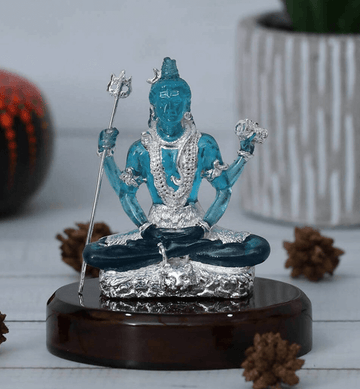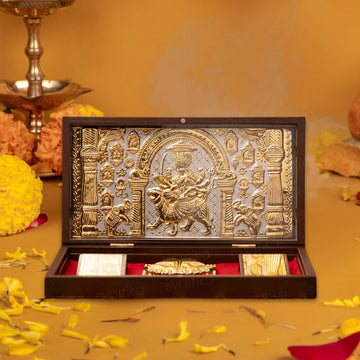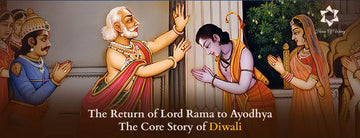In India, festivals are more than just calendar dates.. They are stories, values, and reminders. Some remind us to value family, some remind us of nature, and some quietly whisper that even our daily work is divine. One such festival is Vishwakarma Puja.
If you’ve ever walked through an industrial area, a factory, or even a tiny mechanic’s shop on this day, you would have noticed something unusual. Machines are no longer noisy, greasy, or taken for granted. They are cleaned, decorated, and treated like honored guests. Hammers and spanners are wrapped in red cloth, computers are placed in front of incense sticks, and marigold flowers adorn even the heaviest machines. For one day, the workplace itself becomes a temple.
Our elders always told us, “Respect the hands that feed you, and respect the tools that support those hands.” This is exactly what Vishwakarma Puja significance is all about.
Who is Lord Vishwakarma in Hindu Mythology?
For understanding the Lord Vishwakarma festival, it is necessary to first understand the Lord Vishwakarma. Hindu mythology describes him as the divine architect god Vishwakarma, the divine engineer. The story states that he made the gods' palaces, the golden Lanka for Lord Shiva, the cosmic city of Dwarka for Lord Krishna, and even the powerful Sudarshan Chakra of Lord Vishnu.
He is commonly known as the son of Lord Brahma, who is a very wise leader of creation. To put it simply, Vishwakarma is the one who has the power to visualize, to create, and to come up with something new by using divine precision.
In ancient days, Vishwakarma Puja was for workers. Today, it is also for those people who work in fields, engineers, architects, designers, and the rest of the professionals, in general, people who earn “Roti, kapda, and makan” because of their work, are involved in the process of creation, building, or making a positive impact. As we have all heard from our grandparents, “Jahan rachna hai, wahan rachayita hai.” Where there is creation, there is the creator. That is the true significance of Lord Vishwakarma.
The Origin and History of Vishwakarma Puja
Vishwakarma Puja roots are in the Vedic era. In the Rigveda, Vishwakarma is mentioned as the divine designer who designed space. Eventually, his devotion found its way from the temple to the factory and the house, where the workers and the employees started witnessing his grace in the tools of their trade.
Monarchs and rulers would seek Lord Vishwakarma's blessings before building cities or temples. As time passed, this worship descended into the local communities, where the smallest blacksmith and the carpenter would pay their respect to the tools on this day.
Currently, the same custom is followed in the offices, factories, schools, and IT parks. Our elders most of the time say to us: Tools are not mere things; they are the carriers of your livelihood.
Why is Vishwakarma Puja Celebrated Across India?
The core Vishwakarma Puja importance is a widely spread celebration across India.
- To honor the divine creator, Lord Vishwakarma.
- To pray for safety, harmony, and accident-free workplaces.
- To express gratitude towards machines, tools, and instruments.
- To strengthen the bond between workers, employers, and families.
In many towns, people stop their regular work for the day. Instead, they focus only on worship and celebration. This act of pausing tells us that work may be endless, but respect must never be forgotten.
Our fathers and uncles often recall how, in their youth, entire neighborhoods came together to decorate small factories and workshops for this festival. It wasn’t about business; it was about devotion.
Rituals and Customs of Vishwakarma Puja
Every region has its own touch, but some Vishwakarma Puja rituals are commonly observed everywhere:
- Vishwakarma Puja Decoration: In addition to cleaning and polishing gadgets and machinery, they are also decorated with flowers, tilak, and red cloth.
- Office worship: Instruments of all kinds, such as little sewing machines and large factory equipment, are worshiped from a point of power.
- Offerings and prayers: The incense sticks, fruits, sweets, and coconuts are offered.
- Office gathering: Families and workers come together to perform the vishwakarma puja and share happiness.
If you were to enter a workshop on this day, you would instantly notice the difference. The combination of the smell of incense and the faint smell of grease from machines gives you an experience that is both spiritual and earthy.
Importance of Tools, Machines, and Workplaces in the Puja
The most beautiful part of Vishwakarma Puja traditions is how tools and workplaces take center stage. Instead of idols alone, the very instruments of livelihood are worshipped. This teaches us that:
- Tools carry our efforts and skills.
- Machines symbolize innovation and growth.
- Workplaces hold dignity and respect.
This is why even laptops, cars, or motorcycles are included in the puja. Just like children bow before books before exams, professionals bow before their tools of livelihood. It is a way of saying, “Without you, my work would not be complete.”
Regional Variations of Vishwakarma Puja Celebrations
Vishwakarma Puja celebration in India is celebrated differently in various regions:
- East India (Bengal, Bihar, Orissa, Assam): People fly Colorful kites from factory rooftops to represent joy and freedom.
- North India: Workrooms and factories join hands to organize big community meals.
- South India: It is combined with Ayudha Puja during Navratri, when sacred worship is given to instruments and vehicles.
- Western India: Families and artisans celebrate with small rituals and community gatherings.
If you’ve ever seen kite-filled skies in Bengal during Vishwakarma Jayanti, now you know how much joy this festival brings. It is devotion expressed in color and celebration of gratitude.
Role of Vishwakarma Puja in Industrial and Professional Communities
With modernization, the Vishwakarma day importance has only grown. Industries and companies across India celebrate this day to:
- Seek blessings for the smooth functioning of machines.
- Pray for safety and fewer accidents.
- Acknowledge the contribution of workers.
- Promote harmony between employers and employees.
Even IT offices, where computers replace hammers, perform small rituals. This proves that devotion and gratitude can easily adapt with time.
Traditional Offerings and Prasad During the Puja
No festival in India is complete without food and offerings. During Vishwakarma Puja rituals, people make offerings of:
- Fruits like bananas, coconuts, and seasonal produce.
- Sweets such as laddus, peda, and kheer.
- Betel leaves, incense, and flowers.
After prayers, prasad is shared with everyone. In factories, you will often see owners distributing sweets to all workers, creating an atmosphere of equality and joy.
Spiritual and Cultural Significance of the Festival
The Vishwakarma Puja meaning is not only about rituals. It holds deeper wisdom:
- Work is not separate from worship.
- Labor, in every form, carries dignity.
- Tools and technology are also carriers of divine energy.
- Material progress and spiritual humility must go hand in hand.
My grandfather always says, Kaam hi pooja hai. Vishwakarma Puja is like a flashback to our memory that, no matter if we are working with materials or on computers, the power of creation is pure.
Vishwakarma Puja Today in India
The Vishwakarma Puja festival in India has become very popular nowadays and can be seen in large corporations, IT parks, schools, homes, and mechanics' workshops. Families have gone a step further and have even started putting laptops and smartphones on the altar, seeking blessings for another financial year.
The festival's charm is its capability to embrace modern-day changes. Whether it is a hammer, a sewing machine, a truck, or a laptop, the least thing the festival does is to show devotion and respect for these items, as they are the ones representing the gadgets of the trade.
Conclusion
Vishwakarma Puja is a wonderful means of linking the spiritual energy with materials and gadgets. It teaches us that every creation, every single material we are utilizing, and every bit of our effort on that is nothing but a reflection of our Devotion.
From artisans to engineers, from small workshops to giant industries, the Lord Vishwakarma festival is celebrated with devotion. The festival embraces people of all professions and reminds us that development and prayer can be at our side.
So, next time if you come across garlands hung on machines or kites flying high in the sky on the day of Vishwakarma Jayanti, remember that it is not just about the rituals, but it is also about gratitude, respect, and the pleasure of doing work which has now turned into worship.
And isn't that the thing our festivals are supposed to teach us?










